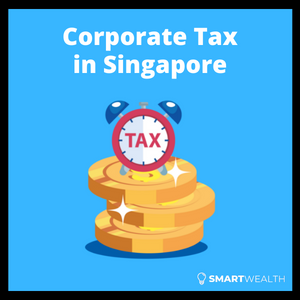Singapore strives to be an open economy and it attracts multinational corporations (MNCs) around the globe.
One of the main reasons why it’s attractive to start a business here is Singapore’s low corporate income tax rates. Furthermore, there’s no lack of tax incentives for companies, new or old, bringing the effective taxes even lower.
If you’re interested in incorporating a company in Singapore, how much money in taxes do you have to pay? And what essential things must you take note of?
We cover all of these questions in this quick guide.
(If you’re interested to know more about the personal income tax structure in Singapore, you can read this article instead.)
So, read on!
Who Needs to Pay Corporate Taxes?
All companies, whether they’re resident or non-resident, have to pay corporate tax on any chargeable income derived in Singapore or foreign income remitted (or deemed remitted) into Singapore.
Tax resident companies, though, do enjoy greater benefits as compared to non-resident ones.
A company is considered a tax resident when the control and management of the business is exercised in Singapore in the preceding calendar year. While “control and management” may seem vague, IRAS has defined it as the “making of decisions on strategic matters, such as those on company policy and strategy“.
Here are some examples to help determine whether a company is a tax resident or not:
- The company’s board of directors meetings were held in Singapore to make key strategic decisions
- Key employees are based in Singapore
SIDE NOTE When was the last time you conducted thorough financial planning or reviewed your finances? In this day and age in Singapore, doing so will absolutely improve the quality of life for you and your loved ones. Here are 5 reasons why financial planning is so important.
What’s the Corporate Tax Rate in Singapore?
Since 2010, the headline corporate tax rate in Singapore is a flat 17% on the company’s chargeable income.
To keep Singapore competitive, the government has reduced the corporate tax rates over the years.
Here are the historical corporate tax rates:
| Effective From | Corporate Tax Rate |
| 2010 | 17% |
| 2008 | 18% |
| 2005 | 20% |
| 2003 | 22% |
As you’ll still need to factor in tax incentives and exemptions (more on that later), the effective tax a company needs to pay is often lower.
How to Calculate the Corporate Tax Payable
To compute the chargeable income, a company takes its taxable revenue and subtracts its deductible business expenses.
According to the IRAS, these types of income are taxable:
- Gains or profits from any trade or business
- Income from investment such as dividends, interest, and rental
- Royalties, premiums, and any other profits from property
- Other gains that are revenue in nature
On the other side of the equation, business expenses refer to the costs incurred to run the business.
Not all business expenses are treated equally though. Only deductible business expenses reduce the chargeable income, thereby reducing the tax payable. Such allowable expenses are “wholly and exclusively incurred in the production of income” and they come with conditions.
Here are some examples of allowable business expenses:
- Marketing and advertising costs
- Fees for accounting
- Payment for bookkeeping services
- Statutory CPF contributions
To put it all together, here’s a simple way to compute the corporate tax payable:
| Taxable Income | $100,000 |
| Business Expenses | |
| Deductible | $10,000 |
| Non-Deductible | $15,000 |
| Chargeable Income | $90,000 |
| Corporate Tax Payable @ 17% | $15,300 |
But we’ve still yet to factor in the various tax incentives, which greatly affect the amount of tax payable.
Tax Incentives for Companies in Singapore
There are three main tax incentives for companies in Singapore:
- Tax exemption scheme for new start-up companies
- Partial tax exemption for all companies
- Corporate income tax rebates
Below, we look into each of them in detail.
1) Tax exemption scheme for new start-up companies
This scheme was introduced in Year of Assessment (YA) 2005 in order to help grow local companies and to encourage entrepreneurship.
Eligible new companies can enjoy the following tax exemptions for their first three YAs.
From YA 2020 onwards, a qualifying company can enjoy a 75% exemption on the first $100,000 of chargeable income. Thereafter, a further 50% exemption is granted on the next $100,000. In other words, new companies can enjoy a maximum of $125,000 in tax exemptions.
| Chargeable Income | Tax Exemption |
| First $100,000 | 75% |
| Next $100,000 | 50% |
As an example, if your company has a chargeable income of $200,000 in YA 2020, under this scheme, your chargeable income is reduced to $75,000. The tax payable will then be $12,750. If your company has a chargeable income of $50,000 instead, with the exempt amount, your chargeable income is reduced to $12,500, and the tax payable will be $2,125.
To qualify for the tax exemption scheme for new start-up companies, here are three conditions:
- The company must be incorporated in Singapore
- The company must be a tax resident in Singapore for that YA
- The company’s total share capital is beneficially held directly by no more than 20 shareholders throughout the basis period for that YA where:
- All of the shareholders are individuals or
- At least one shareholder is an individual holding at least 10% of the issued ordinary shares of the company
This scheme doesn’t apply to new companies whose principal activity is investment holding or to those which undertake property development for sale, for investment, or both.
Even after the first three YAs under this scheme, companies can still enjoy tax exemptions (see the next section).
2) Partial tax exemption for all companies
All companies in Singapore can enjoy a partial tax exemption except those under the tax exemption scheme for new start-ups.
From YA 2020 onwards, qualifying companies can enjoy a 75% exemption on the first $10,000 of chargeable income. Thereafter, a further 50% exemption is granted on the next $190,000. This means that companies can enjoy a maximum of $102,500 in tax exemptions.
| Chargeable Income | Tax Exemption |
| First $10,000 | 75% |
| Next $190,000 | 50% |
For example, if your company has a chargeable income of $200,000 in YA 2020, under this scheme, your chargeable income is reduced to $97,500, and the tax payable is $16,575. If your company has a chargeable income of $50,000 instead, the chargeable income is reduced to $22,500, for a tax payable of $3,825.
3) Corporate income tax rebates
While the above two schemes reduce the chargeable income, tax rebates offset the tax payable.
In YA 2020, all companies were granted a corporate income tax rebate of 25%, capped at $15,000. Here were the rebates given in previous years:
| YA | Corporate Income Tax Rebate |
| 2020 | 25% (capped at $15,000) |
| 2019 | 20% (capped at $10,000) |
| 2018 | 40% (capped at $15,000) |
| 2017 | 50% (capped at $25,000) |
| 2016 | 50% (capped at $20,000) |
| 2015 | 30% (capped at $30,000) |
| 2014 | 30% (capped at $30,000) |
| 2013 | 30% (capped at $30,000) |
As you can see, the rebates given in each YA may differ, and while tax rebates were given out continuously, there’s a possibility that they might stop.
How do we calculate our tax payable after exemptions and rebates?
If a company has a chargeable income of $200,000 in YA 2020, after the partial tax exemption, the chargeable income is reduced to $97,500, with a tax payable of $16,575. However, with a tax rebate of 25%, which equates to $4,143.75 (still within the cap of $15,000), the end tax payable will be $12,431.25.
The following table sums up everything on corporate tax computation:
| Taxable Income | $210,000 |
| Less: Business Expenses | |
| Deductible | $10,000 |
| Non-Deductible | $15,000 |
| Chargeable Income | $200,000 |
| Less: Partial Tax Exemptions | $102,500 |
| Chargeable Income (after tax exemptions) | $97,500 |
| Corporate Tax Payable @ 17% | $16,575 |
| Less: Tax Rebate (25% x $16,575, capped at $15,000) | $4,143.75 |
| Net Corporate Tax Payable | $12,431.25 |
Apart from these three incentives, there are even more schemes and benefits that are offered by the government.
DID YOU KNOW? According to a survey conducted by MoneySense, about 3 out of 10 Singapore residents aged 30 to 59 had not started planning for their future financial needs. This isn't surprising because personal finance can seem complicated and daunting. But really, there are only a few things that you should focus on. Learn how to significantly improve your personal finances with the 7-step "wedding cake" strategy today.
3 Benefits of the Corporate Tax Structure in Singapore
Overall, here are three reasons why the tax structure in Singapore is great for businesses:
1) Low headline corporate tax rates with further tax incentives
By being taxed on profits (and not revenue), you won’t have to pay taxes if you’re making a loss.
With the flat rate of 17% along with all the exemptions, incentives, and rebates, the final corporate tax payable is greatly reduced, lowering tax expenses, and your business is left with more profits.
But doing business in Singapore isn’t just for the corporate tax system. The country is well known to be politically stable, have a large talent pool of locals and expatriates to tap on, and it is in the centre of global trade.
2) One-tier corporate tax system
The corporate tax paid on a company’s chargeable income is the final tax.
As such, dividends paid out by the company to its shareholders are exempt from further taxation.
This single-tier tax system simplifies processes and potentially enables more profits to be earned by shareholders.
3) Avoid being taxed twice
When companies operate in other countries, taxes may be imposed in the foreign country, and when the income is remitted into Singapore, it may be taxed again.
This is where tax treaties come in handy. They are agreements that specify how earned income will be taxed when the company does business in two given countries. The main objective is to avoid double taxation.
Singapore has a total of 105 agreements with other jurisdictions as of 25 Aug 2021. These agreements come in the form of avoidance of double tax agreements (DTAs), limited treaties, and exchange of information (EOI).
Even if companies operate in countries that don’t have tax treaties with Singapore, they may claim tax credits on foreign-sourced income.
Filing Corporate Tax in Singapore: What to Know & Deadlines
There are two filings you’ll need to submit:
1) Estimated Chargeable Income (ECI)
ECI is an estimate of your company’s taxable income, minus the deductible expenses.
All companies are required to file the ECI except those who qualify for an administrative concession or are specifically not required to. For example, to qualify for a waiver, the company’s annual revenue must not be more than $5 million for the financial year and the ECI (before any tax exemption) must be NIL for the YA. For more details, click here.
The deadline to submit the ECI is within three months from the end of the company’s financial year.
2) Form C or Form C-S
Form C and Form C-S are two types of corporate income tax returns. They are meant to report on the company’s actual income, while the ECI is just an estimate. Even companies that did not make a profit have to file Form C-S or C.
Only qualifying companies (usually the smaller ones) may submit the Form C-S, which is a simplified version. For companies that qualify to file Form C-S and and have an annual revenue of $200,000 and below, they are able to file Form C-S (Lite), which is an even simpler version.
The deadline to file Form C-S or C is 30 November.
After the necessary filings, IRAS will typically send a notice of assessment (NOA) to the company by 31 May the following year.
The company then has a one-month period from the date of the NOA to pay its corporate tax.
So, there you have an overview of the corporate tax structure in Singapore. Hope you found it useful!


